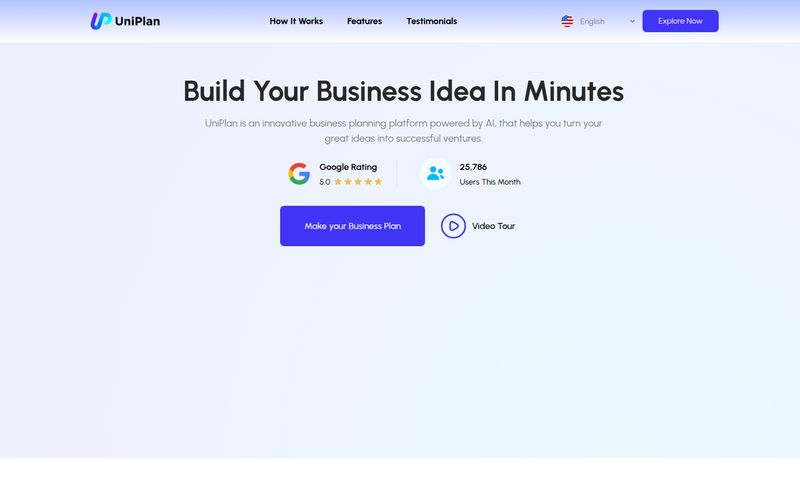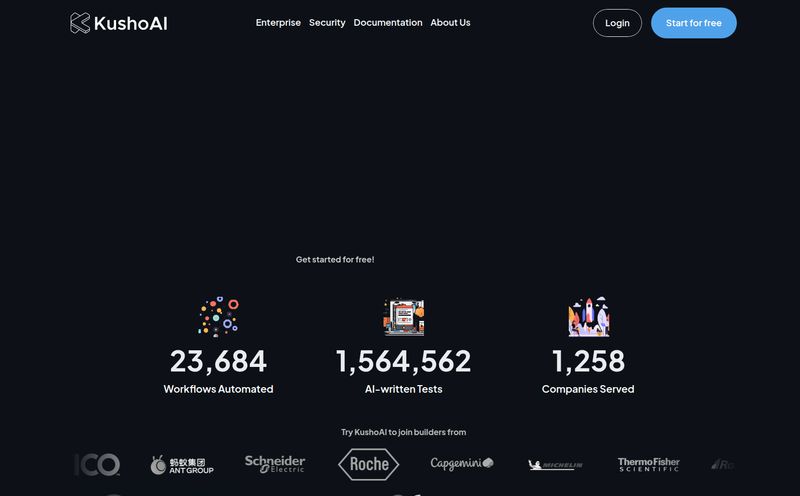For years, we've been in the trenches, fighting the good fight against messy, sprawling, and sometimes just plain wrong documentation. It’s the digital equivalent of trying to find a specific recipe in a library where all the books have been thrown in a giant pile. You know the answer is in there somewhere, but finding it is a whole other story. Every team has one: the dreaded internal wiki, the labyrinthine Confluence space, the folder of markdown files that haven’t been updated since the last World Cup.
So when a tool comes along that claims to fix this, my ears perk up. But my skepticism meter also goes into overdrive. Enter a tool called PresetAI.
Now, before we go any further, let's clear up some potential confusion. If you google "The Preset AI," you'll likely land on a slick-looking site selling Lightroom presets for photographers. Cool, but not what we're talking about today. We're discussing a different beast entirely, one that's aimed squarely at developers, engineers, and the teams that support them. This PresetAI is a chat-based search powerhouse designed to live inside your existing workflow. A pretty big difference, huh?
What Exactly is This PresetAI Thing?
At its core, PresetAI is an AI-powered chatbot you can plug directly into your private knowledge bases. Think of it as a super-intelligent search assistant that doesn't just look for keywords but actually understands the questions you're asking about your own documentation. The big promise is that you can integrate it into the places your team already lives and breathes: GitHub, Slack, Discord, or even your own company website. All with a single line of code.
It’s like having a senior dev on call 24/7 who has somehow memorized every single piece of documentation your company has ever produced. Instead of bugging Sarah from the platform team for the third time about that obscure API endpoint, you just ask the bot in your team's Slack channel. A simple idea, but one with some serious potential to cut down on interruptions and wasted time.

Visit PresetAI
The Promise: Why This Could Change Your Workflow
I’ve seen a lot of tools promise to revolutionize developer productivity. Most of them end up being just another notification to ignore or another dashboard to forget the password to. But some of the features here have me genuinely intrigued.
Getting Set Up is a Breeze (Apparently)
The claim of a "single line of code" integration is bold. We've all been there—the 'simple' integration that turns into a two-day yak shave involving three different dependencies and a call to a support line. However, if PresetAI can actually deliver on this, it removes one of the biggest barriers to adoption. The easier it is to get started, the more likely a team is to actually give it a fair shot. I’m optimistic but with a healthy dose of 'I'll believe it when I see it'.
Search That Actually… Searches?
Let's be honest, the native search function in most documentation platforms is just awful. It's usually a glorified `Ctrl+F` that chokes on anything more complex than a single keyword. PresetAI claims to provide personalized and precise results because it uses AI to understand context. This means you could theoretically ask it something conversational like, "How do I handle user authentication for the v2 mobile API?" and get a real answer, not just a list of 50 pages that happen to contain the word 'user'. If it works, this alone could be worth its weight in gold.
More Than Just a Search Bar: Understanding Your Team
This is the part that really caught my eye. PresetAI offers insights into what your developers are searching for. Think about that for a second. This is a direct line into the pain points of your team. Are ten different developers all asking how to configure the staging environment? Boom. You’ve just identified a massive gap in your onboarding docs. Do people constantly search for a specific function's parameters? Maybe that function needs better naming or in-code comments. This transforms a simple search tool into a diagnostic instrument for improving your documentation and processes. For a team lead or a product manager, that data is pure gold.
Okay, But What's the Catch? A Reality Check
No tool is perfect, especially not a new one. I'm a professional skeptic, so it's my job to look for the gotchas. And there are a couple of things that give me pause here.
The Freemium Wall
The complimentary plan is limited to 100 chats per month. For a single developer kicking the tires, that's probably fine. You can get a feel for the tool, see if you like the interface, and test its accuracy. But for a team? 100 chats could be gone in a single afternoon, especially during a busy sprint. It feels a bit tight and designed to quickly push you towards a paid plan. It’s a classic strategy, but it means a proper team-wide trial might not be possible on the free tier.
The Price is... a Mystery
And speaking of paid plans, the information provided gives us nothing. Nada. Zilch. This is a personal pet peeve of mine. Hiding your pricing behind a "Contact Us for a Demo" button feels so dated. I get it for massive, enterprise-only solutions, but for a tool that seems aimed at developers and agile teams, transparency is always better. It makes me wonder if it’s prohibitively expensive, or if they just want to get you on a sales call. Either way, it’s a hurdle. I just want to know what it costs without having to schedule a meeting.
Who is This Tool Actually For?
So, who should be hitting that (non-existent) pricing page? I see a few key groups.
- Startups and Scale-ups: Teams that are moving fast and probably creating documentation debt as they go. A tool like this could help new hires get up to speed without constantly tapping senior devs on the shoulder.
- Companies with Complex Products: If you have a massive, multi-faceted product with years of legacy documentation, this could be a lifesaver. Making that knowledge base searchable and accessible could dramatically improve internal efficiency.
- Open-Source Projects: This is a big one. Imagine dropping this bot into your project's Discord or linking it in your GitHub README. It could answer common contributor questions, freeing up maintainers to focus on code and strategy. That could seriously lower the barrier to entry for new contributors.
My Final Take: Is PresetAI Worth Your Time?
So, what's the verdict? Despite my gripes about the pricing secrecy and the somewhat stingy free plan, I’m genuinely hopeful about PresetAI. The problem it’s trying to solve is a universal one in the software world. We've poured so much innovation into our code editors, our CI/CD pipelines and our project management tools, but documentation has been left in the dust.
It’s not just about finding information faster; it’s about reducing cognitive load. It’s about preserving that precious state of flow. Every time a developer has to switch contexts to go on a 15-minute archeological dig for a piece of information, productivity plummets and frustration skyrockets.
For a small team or a solo dev, giving the free plan a shot seems like a no-brainer. Hook it up to a small project's documentation and see how it feels. For larger organizations, the value proposition is completely dependent on that mystery price tag. But if the cost is reasonable, the potential ROI in saved developer hours and reduced frustration could be immense. It just might be the knowledgeable librarian your chaotic codebase library needs.
Frequently Asked Questions about PresetAI
- How does PresetAI integrate with platforms like Slack?
- It operates as a chatbot. Once integrated, you can query it directly within your Slack channels or direct messages, and it will respond with answers sourced from your connected documentation.
- Is the free plan with 100 chats/month suitable for a team?
- It depends on the size of the team. For a single user, it's a decent trial. For a team of five or more active developers, 100 chats will likely be used up very quickly, making it more of a limited demo than a long-term free solution.
- Can PresetAI search through private GitHub repositories?
- Yes, it's designed to work with private knowledge bases. This includes private GitHub repos, internal wikis, and other proprietary documentation you connect to it.
- What kind of analytics does PresetAI provide?
- It offers insights into developer search habits, showing you what questions are being asked frequently. This helps identify common points of confusion and areas where your documentation is weak or unclear.
- Is PresetAI related to the photography preset website?
- No. Despite the similar name ("The Preset AI" vs. "PresetAI"), they are two completely different products and companies. The one discussed here is a software development tool for documentation search.
Conclusion
In the end, PresetAI is tapping into a very real, very persistent pain point. The idea of making documentation interactive and intelligent isn't just a novelty; it's a logical next step in improving the developer experience. While the lack of transparent pricing is a significant question mark, the core technology is promising. If you're tired of the endless scroll and the frustratingly useless search bars, this is a tool to keep on your radar. Give the free tier a spin. What have you got to lose, other than a few more hours of your life hunting for that one specific config setting?
Reference and Sources
While direct pricing and platform links for the developer tool were not available for this review, here are some resources on the importance of developer productivity and documentation:
- Stack Overflow Developer Survey - A great resource for understanding developer trends and frustrations.
- Write the Docs Community - A global community of people who care about documentation.
- Atlassian Blog on Developer Productivity - Insights from a company that builds tools for developers.



